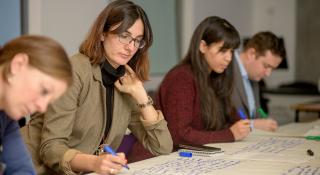Breadcrumbs navigation
BISA at 50: Reflections and perspectives - Supporting varied pathways
As part of our 50th anniversary reflections and perspectives series, we asked some #BISA2025 delegates to share their reflections of the 50th anniversary conference which took place in Belfast. Here we share reflections from Nicholas Wright, a Research Analyst at the Foreign, Commonwealth and Development Office (FCDO), and a BISA trustee.
This year’s BISA annual conference was a special one for me. It was my first time attending as a trustee and also the first time in almost two years that I had been back to Northern Ireland, where I was born and brought up. Here are some of my reflections on what I thought was a terrific event.
- It was great being back in Belfast. I grew up in Northern Ireland in the 1970s and 80s, and the Belfast I recall from my childhood was a very different place to the one that hosted this year’s BISA conference. While Northern Ireland is still confronting the legacies of its very difficult past, seeing how far it has come in the nearly three decades since the Belfast Good Friday Agreement nonetheless filled me with happiness and a sense of pride. I hope, despite one dreadful incident affecting a group of BISA delegates, the majority of those who attended will have left with positive memories of the city and a desire to return.
- There were ideas and inspiration aplenty. The range and variety of panels and individual papers at the conference were a reminder of just how much excellent academic research is being done on complicated and knotty questions – some of it policy-focused, some of it highly theoretical, all of it improving our knowledge and understanding of the world. It also demonstrated BISA’s impressive intellectual convening power in the politics and IR space. And what is exciting is not just what delegates will have learned from the sessions they attended, it’s the many new projects and collaborations that will come out of conversations, chance encounters and new connections made during coffee and lunch breaks. Hopefully the fruits of some of these discussions will be on show in Brighton next year.
- Nurturing and supporting the next generation of researchers is essential work for BISA. I was fortunate to attend the PhD/ECR workshops on the eve of the main conference, and to meet many highly-motivated and determined younger researchers at the start of their academic careers. They were clear-eyed and realistic about the challenges they face – but also about how much they value the support they receive from BISA (and other academic associations). Bringing the next generation forward and providing a place where they can learn research skills but also present their work – some for the first time – is a vital part of BISA’s purpose and its ongoing commitment to this is something we should all continue to champion.
- Non-academic research pathways matter more and more. Alongside BISA Chief Executive Juliet Dryden, I took part in a discussion at the workshop about non-academic research pathways, a subject that has become increasingly prevalent (and relevant) in recent years. The research skills and expertise that PhD students and ECRs are developing are invaluable outside the academy, but more can be done to highlight and signpost this at the outset of a researcher’s career. BISA is ideally placed to promote opportunities for those looking beyond the academy for ways to make the most of their knowledge, skills and expertise, and I hope to be able to contribute to this aspect of their work in particular during my time on the board of trustees.
While it is not a great insight to say that we are living in an era in which knowledge feels increasingly contested and fragmented, that doesn’t make it any less true. Organisations like BISA play an essential role in pushing back against this trend, and in reminding the wider world of the essential role theory, evidence and analysis all play in how we understand our world. This is something that was clear from all the panels I attended in Belfast. Long may this continue – and I’m already looking forward to the discussions in Brighton next year.


